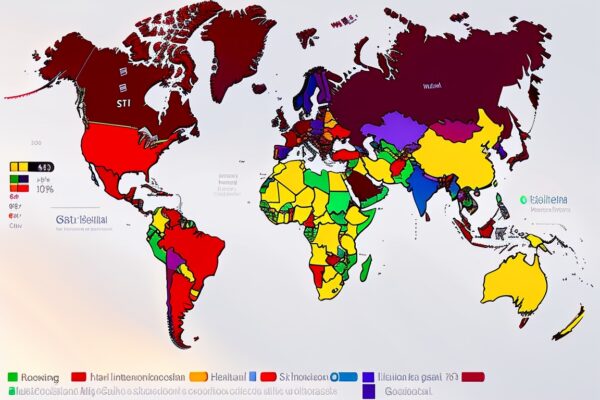Hi Friends, Welcome🙏to SambhogSutra.com – A Symbiosis of Sexual Wellness & Responsible Nutrition. Today’s topic is dedicated to LGBTQ Wellness.🥰

Sexual wellness goes beyond the mere absence of disease; it includes a positive, respectful approach to sexuality and sexual relationships. The LGBTQ+ community faces unique challenges in this realm due to widespread stigma, discrimination, and lack of LGBTQ+ affirming healthcare, leading to disparities in sexual health outcomes. Recognizing these unique challenges underscores the importance of comprehensive, inclusive, and affirming approaches to sexual wellness within the LGBTQ+ community.
Globally🌍, the LGBTQ+ population faces a significantly higher prevalence of sexually transmitted infections (STIs). According to the World Health Organization, men who have sex with men are 19 times more likely to be living with HIV than the general population, and around 45% of them have an STI other than HIV. Transgender women are almost 50 times more likely to have HIV than other adults of reproductive age. These statistics highlight the pressing need for strategies to mitigate risks, such as promoting safe sex practices, regular STI screenings, and improving access to appropriate healthcare services.
In India🇮🇳, the situation is similarly concerning. According to a study published in the Indian Journal of Sexually Transmitted Diseases, men who have sex with men, and transgender individuals, have a high prevalence of STIs, with around 7% living with HIV. This reality is influenced by societal stigma, lack of sexual health education, and inadequate access to LGBTQ+-friendly health services. This data underlines the urgent need for culturally sensitive, comprehensive sexual health strategies, including nutrition education, to support overall wellness and disease prevention in India’s LGBTQ+ population.
Proper nutrition can significantly contribute to sexual wellness. A balanced diet boosts the immune system, playing a critical role in preventing and managing STIs, and offering a more comprehensive approach to sexual health.
Here are 5 Strategies for Sexual Wellness & Nutrition in LGBTQ+ Community🥰

1. Comprehensive Sexual Education📘: Advocate for inclusive, comprehensive sexual education that addresses both STI prevention and holistic sexual wellness. This education should be non-judgmental and tailored to the specific needs of the LGBTQ+ community.
2. Nutrition Counseling👨⚕️: Regular nutrition counseling should be an integral part of sexual health education and healthcare. Highlight the significant role that a balanced diet plays in enhancing the immune system and preventing diseases, including STIs.
3. Accessible Health Services🏥: Develop and maintain sexual health services that are easily accessible, welcoming, and understanding towards LGBTQ+ individuals. Such services can break down barriers and make it easier for people to seek the help they need.
4. Community Outreach Programs🤝: Establish LGBTQ+-friendly outreach programs that focus on the importance of sexual wellness and nutrition. These programs can serve as a platform to exchange information, offer support, and promote healthier lifestyle choices.
5. Peer Education🗣️: Implement peer education programs to raise awareness about the connection between nutrition and sexual health. By sharing accurate information within the community, individuals can make informed decisions about their own health.
Here are 5 interesting Myths & Facts about STIs and Nutrition in LGBTQ+ Community🥰

1. Myth: Nutrition has no impact on sexual health.
Fact: Nutrition plays a crucial role in maintaining a strong immune system and overall health, which can help in preventing and managing STIs.
2. Myth: Only certain groups within the LGBTQ+ community are at risk of STIs.
Fact: STIs can affect anyone, regardless of their sexual orientation or gender identity, if they engage in unprotected sex.
3. Myth: STIs are always noticeable.
Fact: Many STIs can have no noticeable symptoms, making regular testing a crucial part of sexual health maintenance.
4. Myth: Once you’ve had an STI, you can’t get it again.
Fact: Previous infection with an STI does not make an individual immune to future infections of the same or different STIs.
5. Myth: STIs are only transmitted through sexual intercourse.
Fact: While sexual intercourse is a common method of transmission, certain STIs can also be spread through non-sexual means, such as shared needles or from mother to child during childbirth.
Here are 5 Essential Nutrients for Sexual Wellness in LGBTQ+ Community🥰

1. Zinc🥜: Zinc is a vital mineral that supports immune function and reproductive health. A deficiency in zinc can lead to a weakened immune system, making the body more susceptible to infections.
2. Omega-3 Fatty Acids🐟: Omega-3 fatty acids are important for heart health and managing inflammation in the body. These nutrients support overall wellness and help protect against various diseases.
3. Vitamin D☀️: Vitamin D not only promotes healthy bones but also plays a role in immune function. Adequate vitamin D levels can help protect against various health issues, including certain STIs.
4. Probiotics🥛: Probiotics are essential for maintaining gut health, which plays a significant role in immune function. A healthy gut can contribute to a more robust immune system and overall wellness.
5. Antioxidants (Vitamin A, C, E)🍇: Antioxidants combat oxidative stress in the body, supporting overall health. These nutrients can help maintain the body’s natural defenses and promote healthy bodily functions.
Here are 5 Techniques for Promoting Sexual Wellness in LGBTQ+ Community🥰

1. Open Communication: Promote open, non-judgmental discussions about sexual health and nutrition. This can help individuals feel more comfortable seeking advice and help when needed.
2. Mindfulness Meditation: Encourage practices like mindfulness meditation, which can enhance self-care behaviors. Regular mindfulness can lead to more considered decisions about sexual health practices and nutritional choices.
3. Safe-Space Training for Healthcare Providers: Offer safe-space training to healthcare professionals, equipping them to provide LGBTQ+-friendly services. This includes creating an environment where discussions about nutrition and sexual health are welcomed and encouraged.
4. Online Resources: Utilize the reach of the internet to share information about nutrition and its role in sexual health. This could involve maintaining an informative website, running a blog, or managing social media channels dedicated to the cause.
5. Regular Health Check-Ups: Encourage regular medical screenings for STIs and nutritional deficiencies. Regular consultations with dietitians or nutritionists can help individuals maintain a diet that supports sexual wellness.
For more in-depth information on LGBTQ Sexual Wellness, we invite you to visit the link provided below. This comprehensive article will offer further insights and valuable knowledge to enhance your overall well-being.
Nutrition’s Influence on Gender Dysphoria & LGBTQ Sexual Wellness
Or Read more related topics: https://sambhogsutra.com/category/lgbtq/
Disclaimer: The ingredients mentioned in this blog post may have some health benefits, therefore cannot be a substitute for professional medical advice. Consult with your doctor before starting any supplementation program, especially if you have any chronic health conditions. The information shared in this blog post is collected from the best online resources for educational and awareness purposes only. It should not be used to diagnose or treat any medical conditions.
SambhogSutra.com firmly believes to respect each other’s boundaries, freedom, and preferences in all romantic relationships. We always try to be honest and transparent through our shared content hence it is not meant to mislead or hurt anyone’s feelings.



